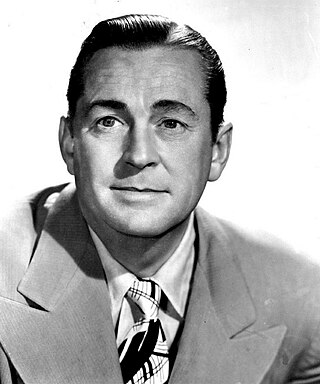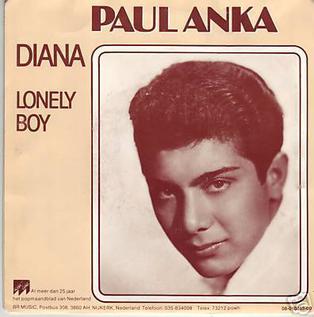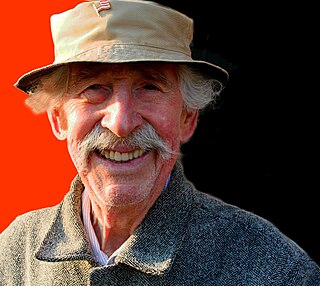Related Research Articles
This is a list of notable events in music that took place in the year 1960.
A television pilot in United Kingdom and United States television, is a standalone episode of a television series that is used to sell a show to a television network or other distributor. A pilot is created to be a testing ground to gauge whether a series will be successful. It is, therefore, a test episode for the intended television series, an early step in the series development, much like pilot studies serve as precursors to the start of larger activity.

James Howard Dunn, billed as Jimmy Dunn in his early career, was an American actor and vaudeville performer. The son of a New York stockbroker, he initially worked in his father's firm but was more interested in theater. He landed jobs as an extra in short films produced by Paramount Pictures in its Long Island studio, and also performed with several stock theater companies, culminating with playing the male lead in the 1929 Broadway musical Sweet Adeline. This performance attracted the attention of film studio executives, and in 1931, Fox Film signed him to a Hollywood contract.
Cameo-Parkway Records was the parent company of Cameo Records and Parkway Records, which were major American Philadelphia-based record labels from 1956 and 1958 to 1967. Among the types of music released were doo-wop, dance hits, popular/rock, rockabilly, big band, garage rock, soul and novelty records.

Robert Louis Ridarelli, known by the stage name Bobby Rydell, was an American singer and actor who mainly performed rock and roll and traditional pop music. In the early 1960s, he was considered a teen idol. His most well-known songs include "Wildwood Days", "Wild One" and "Volare" ; in 1963 he appeared in the musical film Bye Bye Birdie.

Mark Rydell is an American film director, producer, and actor. He has directed several Academy Award-nominated films including The Fox (1967), The Reivers (1969), Cinderella Liberty (1973), The Rose (1979), and The River (1984). He was nominated for an Academy Award for Best Director for On Golden Pond (1981).

An anthology series is a written series, radio, television, film, or video game series that presents a different story and a different set of characters in each different episode, season, segment, or short. These usually have a different cast in each episode, but several series in the past, such as Four Star Playhouse, employed a permanent troupe of character actors who would appear in a different drama each week. Some anthology series, such as Studio One, began on radio and then expanded to television.

"Diana" is a song written and first performed by Paul Anka, who recorded it in May 1957 at Don Costa’s studio in New York City. Anka stated in his autobiography that the song was inspired by a girl named Diana Ayoub, whom he had met at his church and community events, and had developed a crush on.
The 1955–56 network television schedule for the four major English language commercial broadcast networks in the United States. The schedule covers primetime hours from September 1955 through March 1956. The schedule is followed by a list per network of returning series, new series, and series cancelled after the 1954–55 season.

Lee Goldberg is an American author, screenwriter, publisher and producer known for his bestselling novels Lost Hills and True Fiction and his work on a wide variety of TV crime series, including Diagnosis: Murder, A Nero Wolfe Mystery, Hunter, Spenser: For Hire, Martial Law, She-Wolf of London, SeaQuest, 1-800-Missing, The Glades and Monk.

CBS Summer Playhouse is an American anthology series that ran from June 12, 1987 to August 22, 1989 on CBS. It aired unsold television pilots during the summer season.

Alessandro Carmelo "Teddy" Randazzo was an American pop songwriter, singer, arranger and producer, who composed hit songs such as "Goin' Out of My Head", "It's Gonna Take a Miracle", "Pretty Blue Eyes", and "Hurt So Bad" in the 1960s.

Alfred Viola was an American jazz guitarist who worked with Frank Sinatra for 25 years. He played the mandolin on the soundtrack of the film The Godfather.
In 1959, radio and television personality and television producer Dick Clark organized and produced a concert tour of rock and roll and rhythm and blues artists, many of whom had appeared on his music performance and dance television program, American Bandstand. The show was billed as Dick Clark's Caravan of Stars. Its success prompted additional tours. The last of the concerts toured in 1966.
Glynis is an American sitcom that aired Wednesdays at 8:30 pm on CBS from September 25 to December 18, 1963.
Happening '68 was a rock-and-roll variety show produced by Dick Clark Productions, which aired on the American Broadcasting Company (ABC) network. The show followed American Bandstand on Saturday afternoons. Happening '68 premiered on January 6, 1968 and was popular enough that ABC added a weekday spin-off. It's Happening ran on Mondays through Fridays from July 15, 1968 through October 25, 1968. When 1968 ended, Happening '68 became just Happening, which was canceled in October 1969.

Vacation Playhouse is an American anthology television series that was broadcast on CBS during the summer months from 1963 through 1967.

Summer Playhouse is a 30-minute anthology television series that aired on CBS during the summers of 1964 and 1965. It consisted of unsold television pilots.
The Scarface Mob is an American film noir crime film directed by Phil Karlson and starring Robert Stack. It consists of the pilot episodes for the TV series The Untouchables (1959) that originally screened as a two-part installment of Westinghouse Desilu Playhouse on April 20 and 27 1959. The episodes were cut together and released theatrically as a stand-alone feature outside America in 1959 and inside the US in 1962.
David Friedkin was an American writer and director of radio shows, film, and television shows.
References
- ↑ Goldberg 2015, p. 114.
- ↑ Irvin 2020, pp. 42–3.
- ↑ Irvin 2020, p. 43.
- 1 2 "Swingin' Together (Unsold Pilot)". Television Obscurities. May 20, 2010. Retrieved May 8, 2020.
- ↑ Standard Catalog of American Records 2000, p. 972.
- ↑ "Pilot Episodes". Broadcasting . 62: 119. February 26, 1982.
- ↑ Goldberg 2015, p. 113.
- ↑ "'Vacation Playhouse' Lists Comedy Fare For Monday". The Daily Herald . August 26, 1963. p. 14 – via Newspapers.com.

- ↑ Van Horne, Harriet (August 27, 1963). "Rejected 'Pilots' On Summer Show". The Pittsburgh Press . p. 42 – via Newspapers.com.

- ↑ "Previews of the Top Shows: Monday, August 26". The Morning Call . August 25, 1963. p. 63 – via Newspapers.com.

- ↑ "Tonight's Previews". Philadelphia Daily News . August 26, 1963. p. 35 – via Newspapers.com.
